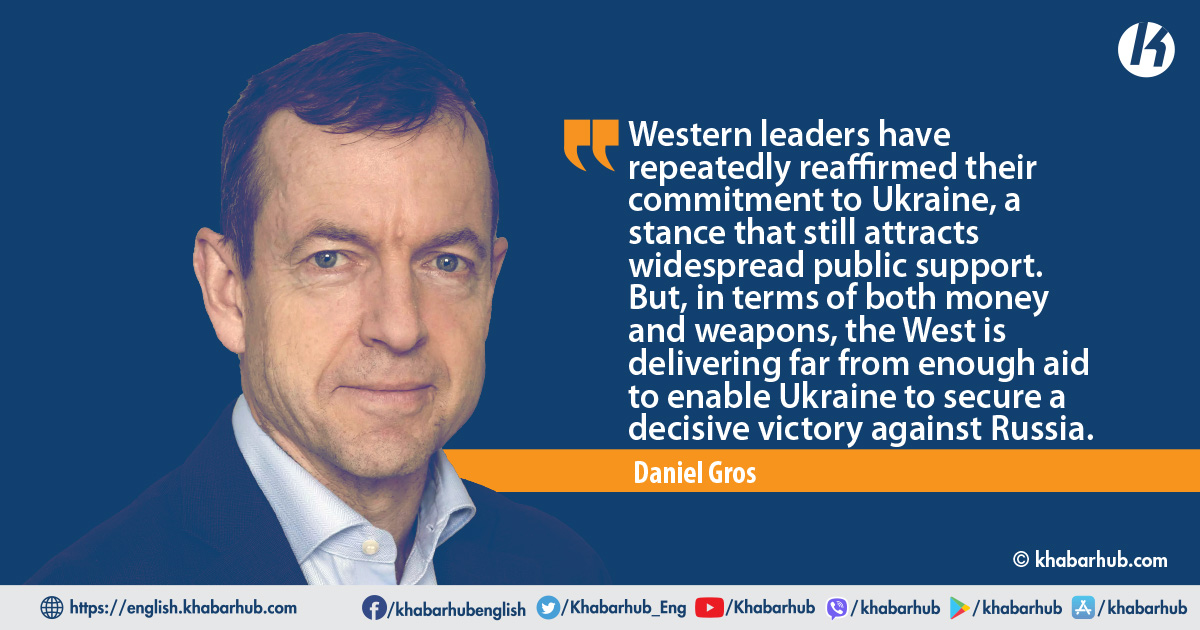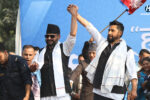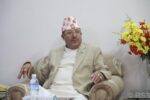A year after the Russian invasion, the Ukraine war has become one of attrition, with each side hoping to wear the other down first.
The superior morale and leadership of the Ukrainians still affords them an important advantage. But in a war of attrition, the balance of resources is the decisive factor.
Ukraine’s economic potential is negligible. Having plummeted by over 30% in 2022, its GDP now amounts to just one-tenth that of Russia.
And that gap is set to grow: the International Monetary Fund expects the Russian economy to grow a bit in 2023. On its own, Ukraine clearly would be unable to sustain a war of attrition for long.
But, of course, Ukraine is not on its own; it has the backing of the European Union, the United Kingdom, and the United States – economies with a combined GDP of nearly $45 trillion. Russia’s GDP, by contrast, amounts to just $1.6 trillion – roughly the same as Italy’s, and just over 3% that of the NATO alliance.
In purchasing-power-parity terms, however, the West’s relative advantage declines significantly: from about 30:1 to 10:1.
The most accurate comparison of the two sides’ advantages should lie somewhere in between – say, 20:1 – because Russia produces much of its military equipment cheaply at home.
Surely, you might be thinking, this crushing economic advantage would translate into enough support to enable Ukraine to win a war of attrition with Russia. But a closer look at the numbers is sobering. The Kiel Institute’s Ukraine Support Tracker shows that the EU and the US have together committed about $150 billion – about 0.3% of their GDP – in aid to Ukraine, and not all of it has been disbursed or delivered.
Fearing that the annexation of Kuwait would give Iraqi dictator Saddam Hussein control over too large a share of the world’s oil reserves, the US assembled a 35-country coalition whose combined forces easily defeated Iraq’s demoralized troops.
Would financial support totaling 0.2-0.3% of donor GDP be enough to give Ukraine a decisive material advantage? Absolutely not.
In fact, Russia would have to spend just 4-6% of its GDP to match such funding levels. With Russian President Vladimir Putin having acquired near-absolute power, and the Russian population proving generally acquiescent, this seems eminently feasible.
To make the cost of war unbearable for Russia, the West would have to double or even triple its support for Ukraine.
Translating economic potential into military means takes time. In the short run, one must also consider each side’s available stock of heavy equipment.
And here, again, support for Ukraine remains inadequate. The tank saga is a case in point. More than a year after the invasion, and over a month after Germany gave European countries permission to send German-made Leopard 2 tanks to Ukraine, only a few dozen – just 2-3% of the total available in Europe – have been made available to the country, with most yet to be delivered.
Russian-made tanks might be inferior, but there are thousands of them. Likewise, Western “smart” ammunition might be a hundred times more efficient than Russian ammunition, but it is also a hundred times more expensive, and little of it is available. That pattern holds across many other areas.
Stalin is supposed to have remarked that quantity has a quality all of its own. It is not realistic to expect Ukraine to liberate more of its territory, let alone drive Russia out completely, when Russia has such a clear quantity advantage in terms of weapons and potential fighters.
This situation stands in stark contrast to European and American declarations of solidarity with Ukraine. Opinion polls confirm that 74% of Europeans still support the EU’s provision of aid to Ukraine and its sanctions against Russia.
Ukraine has vowed never to accept territorial conquest, insisting, with the support of its allies, that negotiations can begin only after Russia withdraws completely from Ukrainian territory. But if that is the goal, the West needs to put its money where its mouth is.
In the US, public support for sending weapons to Ukraine stands at nearly 50%, and in recent months, both President Joe Biden and Treasury Secretary Janet Yellen have visited Kyiv, in order to send the message that Ukraine can continue to count on the US.
But public opinion and political rhetoric matter only if they lead to material support. What is decisive is the willingness to pay, and across the West, this seems to be lacking.
Contrast this with the Gulf war of 1990-91, which began when a large country (Iraq) invaded and occupied its much smaller neighbor (Kuwait).
Fearing that the annexation of Kuwait would give Iraqi dictator Saddam Hussein control over too large a share of the world’s oil reserves, the US assembled a 35-country coalition whose combined forces easily defeated Iraq’s demoralized troops.
While Germany did not send any soldiers, it contributed $6 billion to the effort – much more, as a share of GDP, than it has given to Ukraine.
The West seems to be hoping for a miracle – a full-scale version of Russia’s crushing failure to take Kyiv last year. But even Putin can learn, and Russia’s military has already adjusted its tactics for the war of attrition that has emerged. A victory in Ukraine is unlikely to come on the cheap.
Western leaders might soon have to make a choice: either double or even triple material and financial support for Ukraine, or watch Russia keep the territories it occupies today.
Ukraine has vowed never to accept territorial conquest, insisting, with the support of its allies, that negotiations can begin only after Russia withdraws completely from Ukrainian territory. But if that is the goal, the West needs to put its money where its mouth is.
(Daniel Gros is Director of the Institute for European Policy-Making at Bocconi University)
Copyright: Project Syndicate









Comment